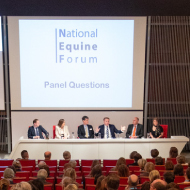National Equine Forum details announced

The National Equine Forum will take place in London on the 5 March 2020.
Vets, government officials and leading figures from the equestrian sector are set to share their knowledge and inspire debate at the 28th National Equine Forum (NEF).
The annual event will take place on the 5, March 2020 in London and will cover a myriad of important topics relevant to the equine sector. A highlight of the programme will explore why human behavioural science is so important for the equine sector.
In a session exploring how human behaviour change can make a difference to horse welfare, BEVA council member David Rendle will discuss behaviour change and its potential impact on worming compliance.
The session will also include a talk about colic from University of Nottingham professor Sarah Freeman, and a discussion on strangles from Abigail Turnbull of the Richmond Equestrian Centre.
David Rendle said: “Changing human behaviour offers the key to improving equine welfare in the UK. Veterinary surgeons understand the medical needs of their patients but have insufficient understanding of the drivers of human behaviours which are frequently implicated in equine health and disease. They also lack the right tools with which to implement human behaviour change.
"Looking specifically at the responsible use of anthelmintics, will owners with an emotional connection to an individual ever put the interests of the equine population first? Will striving for behaviour change ever be sufficient in this scenario or does change need to be enforced to put animal welfare ahead of human sentiment?”
The NEF will also include a comprehensive session on Brexit, animal health, emerging diseases, and what has been knowledge has been gained from the 2019 equine flu outbreak. Audience members are invited to participate during Q&A segments, while those watching the live stream can submit questions via social media.
For more information about the event, visit www.nationalequineforum.com



 The Veterinary Medicines Directorate (VMD) is inviting applications from veterinary students to attend a one-week extramural studies (EMS) placement in July 2026.
The Veterinary Medicines Directorate (VMD) is inviting applications from veterinary students to attend a one-week extramural studies (EMS) placement in July 2026.